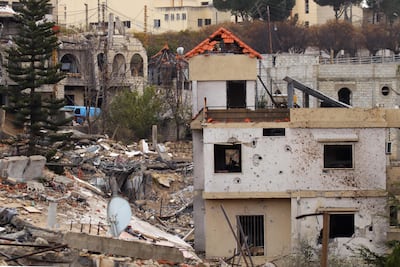Live updates: Follow the latest on Israel-Gaza
Israel's eviction orders preceding attacks on Lebanon constituted a “grave breach” of international humanitarian law, a report released on Friday said.
After Israel massively increased its bombardment of Lebanon in late September, its Arabic language military spokesman regularly issued what it referred to as “evacuation” orders to residents ahead of bombing campaigns.
The joint report by ActionAid and Oxfam found that such orders, referred to by the authors as forced displacement orders, came with insufficient time to evacuate and often in the middle of the night. Typically they were issued with only 15 to 45 minutes' notice of strikes, while most – 62 per cent – came between 10pm and 5am. The report found that 223 towns across south Lebanon were subject to “mass forced displacement orders”.
“Customary international humanitarian law prohibits forced displacement by parties to the conflict and permits evacuation only under circumstances that provide robust protections for civilian welfare, including access to proper accommodation, hygiene, health services, nutrition and family unity,” the report states.
“Israel’s forced displacement orders in Lebanon lacked these essential provisions. They failed to provide displaced populations with access to basic services or secure accommodation. Consequently, these actions amount not to lawful evacuation orders but rather to forced displacement – a grave breach of international humanitarian law,” it adds.

The Israeli military would issue maps that detailed alleged Hezbollah infrastructure that was about to be attacked. The report said that such maps were often “unclear, difficult to interpret and contained inaccuracies regarding distances”. They also referred to areas or landmarks that did not exist in the area or mentioned names that were outdated or unfamiliar.
“The chaos, destruction, and disruption caused by these displacements will continue to affect the most vulnerable communities long after the ceasefire,” said Oxfam Lebanon's director Bachir Ayoub. “Essential services like clean water and health care have been damaged, while the disruption of schooling has deprived tens of thousands of children of their basic right to education.” While a ceasefire between Hezbollah and Israel is tenuously holding, the extent of the damage on Lebanon is only now being revealed.
Mr Ayoub's rhetoric was echoed by Sudipta Kumar, ActionAid’s Arab Region director. “The impact of these attacks by Israeli forces will be felt for many years to come. After the ceasefire, thousands of families returned to their towns and villages to find their homes reduced to wreckage. Many have been left with nothing and cannot afford to rebuild,” he said.
Israel's bombardment of Lebanon has left vast swathes of the country destroyed, with 1.4 million displaced and well over 4,000 people killed.
